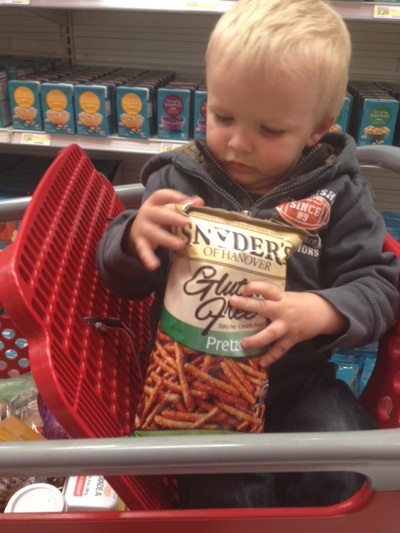
Okay, I want to be fair here. . . in all respects. First, they were not taking themselves to task to explore the symptoms of allergies, but the causes. So it would seem reasonable that they might specifically mention the rise in allergies in regard to the major and very highly publicized culprits . . . wheat, dairy, milk, gluten products, artificial sweeteners top the list right off the top of my head (and I'm just a retired educator trying to make a go at a writing career -- what do I know?) . . . And then they might have wanted to explore the reasons why WHY? the incidence in allergies associated with these particular foods have manifested and increased exponentially over the last thirty years. That number is documented by various sources (I'll provide references). And it's actually a very interesting number to me, because with it I can personally trace the history of this seemingly strange phenomena of mysterious food allergies, while also demonstrating the perplexing history of denial from the mainstream medical field.
My Brittany (momma to the two litte allergy ridden cuties pictured above and below) will be thirty years old this December. I nursed her until she was about a year old, and then, as was - maybe is - standard protocol, I began to give her whole milk from a sippy cup. And the very first time I ever did, she broke out in bright red hives from just below her eyes to her to the top of her belly and began wheezing like a dying cat. By the time I got her to the doctor, the hives had faded and she was breathing normally (of course). Now at the time, my husband was in the military, and we didn't have one particular pediatrician with whom we'd built a relationship. So this doctor didn't know me from a flighty Eve. When I explained what had happened, she looked at me condescendingly, and just said no. No, what? I asked. No, it wasn't the milk. I must be mistaken, she said. True milk allergies in children are very, VERY rare, she told me. It had to have been something else. So I took Brittany home, fed her normally for a few days, and then tried the milk again. Within seconds, she had hives the size of strawberries, and back to the doctor we went, but this time I packed up the sippy cup and brought it along. The next doctor was slightly less condescending when I told the story, and took the time to explain to me just how many mothers actually believed that their babies were allergic to milk. "They think that just because they throw up, that it means an allergy. Intolerance is not the same thing." Although that explanation sounded suspect to me, it wasn't my most immediate concern. Obviously, she hadn't listened to a word I said. So I plopped my baby up onto the table, handed her the sippy cup, and said, "Watch this." It seemed the only way. Pretty soon there was a whole crowd of doctors gathered around as if this was the strangest anomaly they'd ever witnessed.
And maybe it was thirty years ago. Maybe the newness of the allergy epidemic genuinely challenged everything that doctors had learned in medical school. But what I can't understand, what I absolutely cannot fathom is the persistent, pervasive, and collective denial that has been maintained over the course of the last three decades. Case in point: not long ago I visited my own family practice doctor for a routine physical and she noted my chronic, mild asthma. There's no rhyme or reason, I told her. It flares up at the oddest times. I can do a hard forty-five minutes on my elliptical without the slightest wheeze, but then, I'll eat something and have to run for my inhaler. . . Is it possible, I had asked her, that it's connected to my diet? She gave an emphatic no. She wasn't interested in exploring any further. She didn't seem to want to even entertain the thought.
Here's a more extreme example, and one that makes me angry. In 2006, when she was thirteen, my niece, Whitney, woke up one morning with a headache that would persist in varying degrees of pain over the course of the next several years. Her pediatrician initially diagnosed her with a sinus infection and prescribed antibiotics. When the pain persisted unabated, she went to have her eyes checked, and nothing unusual was noted. At a loss, her pediatrician referred her to a pediatric neurologist who ordered a series of extensive tests which included cat scans, an MRI, and a spinal tap. Nothing yielded any answers. Subsequently, she was prescribed a regimen of medications, often up to four or five at a time, monitored, and switched to different medications every eight weeks or so. In addition to pain pills, these included blood pressure and anti-siezure medications. Whitney's parents drew the line at suggested anti-depressants, but they agreed to take her back to an ophthalmologist - a specialist this time -- and hit another dead end. Finally, Whitney was scheduled to be admitted to a renowned head pain clinic for a two week stay for the purposes of more extensive testing and monitoring. Once there, She was hooked to an IV drip that administered heavy doses of pain medication 24 hours a day, given daily injections in her forehead, and sent to see a psychiatrist to make sure that the pain was not all in her head. Seriously. And, as if to make up for the indignities, she was allowed to eat anything she wanted . . . anything. And because we felt so terribly bad for her and wanted to do anything we could to make her feel better, my husband and I stopped by Subway on the way to the clinic to see her, and picked her up a 6" tuna sub on Monterrey cheddar bread. And the headache continued. Not long after that someone suggested that maybe, just maybe . . . Whitney had a food allergy. Her parent's scheduled an appointment with a doctor who specialized in homeopathy, and who recommended the tedious process of extensive allergy testing. On a late December day, three years after the Hellish ordeal began, Whitney was officially diagnosed with Celiac disease and altered her diet dramatically to include no wheat products or wheat byproducts, which include the gluten protein responsible for making her sick for years. Within two weeks, she was pain free, and has since remained. Except for those times when something unexpected creeps up on the menu, like French fries that have been cooked in the same basket as a previous food and one that contains gluten laden oil residue, or a sauce that has amounts of gluten so minuscule that it's not listed in the ingredients. At these times, when the poison manifests, it takes Whitney days to fully recover; since the time that her malady developed, it evolved to severe digestive problems in addition to the headaches.
Sadly -- and I'm not trying to minimize her plight by any stretch of the imagination -- Whitney is far from from alone in her new normal - horrifyingly far when you consider the numbers of children, tens of thousands like her, like my grandchildren, who are being plagued by something so prevalent that it's common knowledge. That any intelligent, informed person would dare to throw up their hands and feign ignorance is infuriating.
Of course nobody tries to deny the allergies anymore. There's too much evidence. But what I want to know is exactly how long it will be until the mainstream medical field, as well as other people (like the media) who can be be influential in reform, and who have a responsibility to inform the public, will actually be courageous enough to confront the source of the poison(s) in our food, and fully acknowledge the full range of side effects that plague the American public . . . Because for all their shuffling and sidestepping, they have to know it's in the food. And in circling back to my intent to be fair to the news anchors (and even the allergy specialist), I understand, of course, that they are accountable to higher powers that ultimately dictate how and what they report in the news. And I even understand the dangers in committing blame in something so pervasively sinister. But what I don't understand is the decision to illuminate the problem while ignoring the obvious causes and solutions. So since they put it out there, here's what they should have talked about, the direction they should have pointed the people. . .
Thirty years ago in the U.S. began the widespread, worldwide hybridization of crops, specifically wheat, but corn and soy to name a few others, ostensibly for the purpose of growing and harvesting crops more efficiently, more economically. The process is commonly referred to as genetically modified organisms (GMOs). The whole genetic structure, the gluten protein in the grains that make bread, a staple of the common diet, was changed, and people all over the world have been falling ill with strange maladies ever since. This has been so widely recognized that the "new" crops have been dubbed Frankenfood . . . recognized to the degree that the European Union and other countries have long since banned GMOs. Over the course of those same years, animals raised in captivity for the production and manufacture of meat have been treated inhumanely, bred for mass production in confined quarters, often chained in darkness for their entire lives, and fed that same diet of GMO grain. To counter the effects of the resulting sick animals, they're injected with antibiotics and hormones to fatten them up, sent to the slaughter, and butchered for human consumption. When grocery stores offer choices of grass fed beef, free range chicken, wild caught fish, and organic milk, this is the process they are trying to counter. Although it's not conventional doctors and it's not the media, it's good to know that at least somebody is giving inadvertent acknowledgment to the problem by offering a solution. But there are others that give more than just a tacit nod. The aforementioned homeopathic doctors, and chiropractors, whose philosophies include all natural healing and diet . . . doctors who are not beholden to the American Medical Association and reliant on kickbacks from pharmaceutical companies, the big corporations who would prefer to just keep handing you the box of very expensive band-aids rather than just collaborate the ultimate solution.
But there, now I've said too much, more than I have time to elaborate, and I haven't even touched on the chemicals (Round Up by Monsato), and the artificial sweeteners, and the genetically modified sugar (Monsanto again). . . and the genocide of the bumblebees (yes, the bumblebees) . . . but I'm assuming you've heard . . . particularly if I've held your attention this far . . . at least you've heard. But maybe you didn't know quite so much, or didn't want to. I would consider my knowledge base just slightly above average only for the fact that I've witnessed firsthand effects of the crazy . . . and also I'm insatiably curious and have a little time on my hands. If you want to know more, go ahead and google "the history of Monsanto" . . . It's interesting that in terms of search engine optimization (SEO), that the official company history and timeline ranks one below the demonization of the company. Read both and YOU decide, if you're a skeptic . . . if you don't believe that a single company in pursuit of the almighty dollar can and would victimize an entire nation, the world even, and hold the power to create cowards. And that's just one company. Google around a little, and read Seeds of Deception by Steven M. Druker, or explore the website of the same name that features the documentary of Jeffrey M. Smith Genetic Roulette, the Gamble of Our Lives. Order Wheat Belly from Amazon (William Davis) or explore the philosophies of Dr. Joseph Mercola through his website or his book The No Grain Diet. This is common knowledge and nobody has to ask, in earnest, why our children are growing up sick. There is a watershed of information, and easy solutions.
When the doctors finally had to acknowledge that my daughter did, indeed, have a true milk allergy, they sent me home with a bee sting kit and pretty much just bid me good luck. It took three miserable years to correctly diagnose my niece. But with the help of some knowledgable people and natural remedies, I no longer need to use an inhaler (yes, I'm gluten sensitive, as well). . . and I'm grateful . . . so grateful that, in spite of a difficult, sometimes painful, and often winding road to adjust to their specific needs, that my grandchildren were diagnosed early and live in a world where they can grow up healthy and with viable, healthy food choices . . . and that even if they don't know, they really don't know . . . at least some of us have got this figured out. Thank God.



